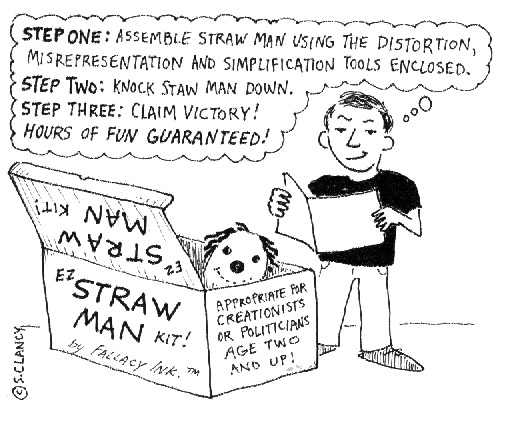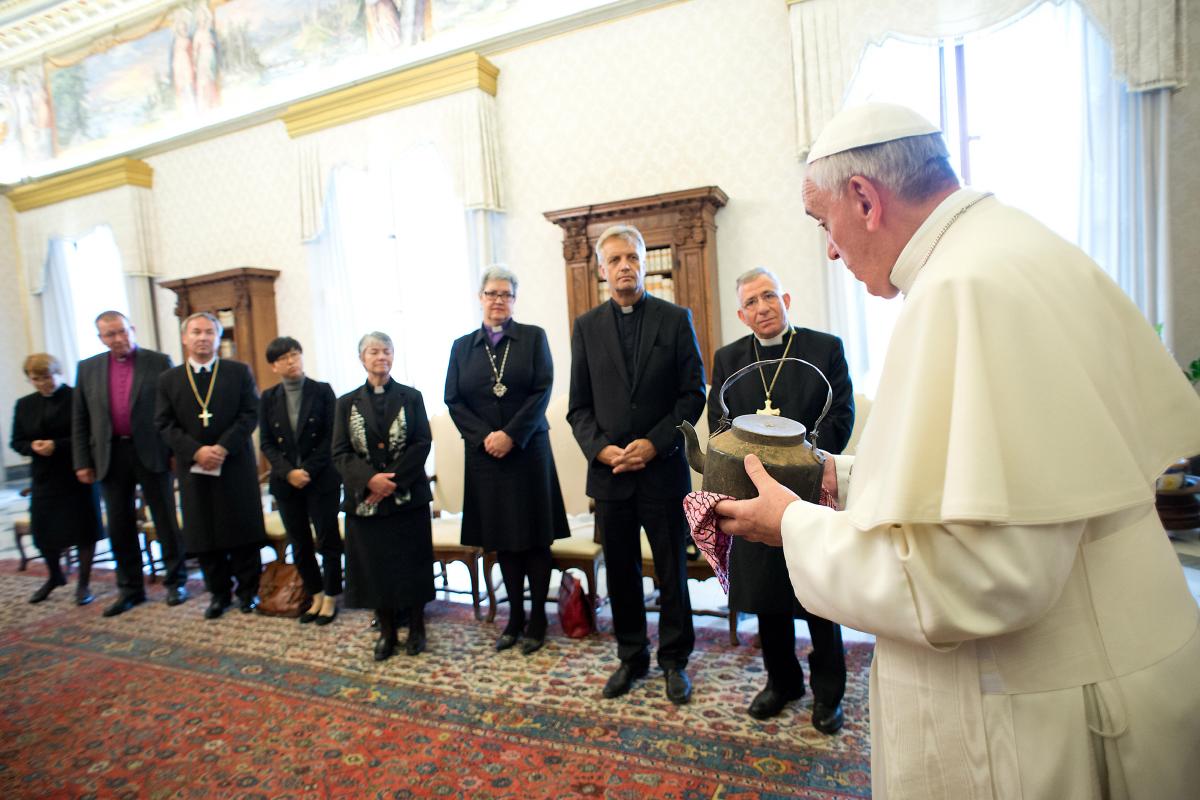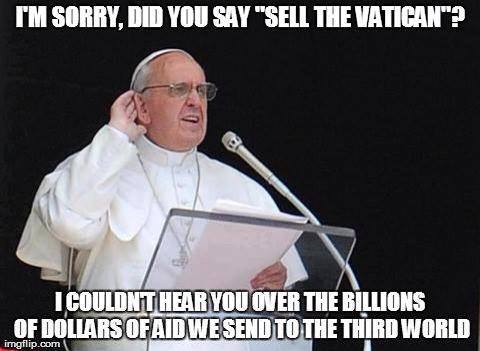If the RCC is not a denomination, then each parish is entirely autonomous and independent... they share NOTHING: no common name, no common governance, no common catechism, no common ministry; each parish ENTIRELY independent. I was a Catholic for years, and I can tell you, there is no denomination that is MORE of a denomination than the RCC.
If you left the historic Church with this nonsense, you weren't much of a Catholic.
Nor did the LCMS or WELS or LDS or UCC or most other denominations. But of course, the Orthodox would insist the RCC separated from it (but the RCC insists it is the other way around).
There was no RC Denomination in the first century. But if you could show me an Official Catechism of the distinctive RC Denomination from the First Century and show me that every word, every letter is IDENTICAL to my 1994 edition -nothing different, nothing added, the identical 2,865 points - then I'll yield that its teachings haven't changed, but you can't do that and that would only prove my point - that it's a denomination (non-denom churches don't have a Catechism for the denomination).
Now what any of this has to do with the OP is beyond me....
And how anything you posted shows that the RCC has a unity of NONE I just don't know. Maybe you could list for all all the non-Catholic denominations that agree with the RCC on all 2,865 points exactly as worded in my 1994 edition of the Catholic Catechism - and thus show the churches it has unity with, but we both know: that's zero. The MOST it has is current, official, denominational unity with ITSELF EXCLUSIVELY - and there is no denomination on the planet that can't say AT LEAST that much (and many, much more). Does that make the RC Denomination "bad?" Not necessarily (there are other denominations in the same boat), it just makes your comment wrong.
Back to the topic....
- Josiah[/QUOTE]
C.S. Lewis, the famous Anglican writer, once wrote:
The very possibility of progress demands that there should be an unchanging element . . . the positive historical statements made by Christianity have the power . . . of receiving, without intrinsic change, the increasing complexity of meaning which increasing knowledge puts into them.
The Catholic Church, in agreement with Lewis, defines doctrinal development as a growth of depth and clarity in the understanding of the truths of divine revelation.
It is important to understand that the substantial or essential truths at the core of each doctrine remain unchanged. Only the subjective grasp of men increases. This increase is the result of the prayerful reflection of the Church, theological study and research (often occasioned by heretical challenges), practical experience, and the collective wisdom of the Church's bishops and popes, especially when joined in Ecumenical Councils.
Like many Christian doctrines, the idea of doctrinal development is based on much implicit or indirect scriptural evidence. The best indications are perhaps
Mt. 5:17,
13:31-2,
Jn. 14:26,
16:13,
1 Cor. 2:9-16,
Gal. 4:4,
Eph. 1:10,
4:12-15. Furthermore, doctrine clearly develops within Scripture ("progressive revelation").
Examples:
- doctrines of the afterlife,
- the Trinity,
- the Messiah (eventually revealed as God the Son),
- the Holy Spirit (Divine Person in the New Testament),
- the equality of Jews and Gentiles,
- bodily resurrection,
- sacrifice of lambs evolving into the sacrifice of Christ, etc.
Not a single doctrine emerges in the Bible complete with no further need of development.
In general, whenever Scripture refers to the increasing knowledge and maturity of Christians and the Church, an idea very similar to doctrinal development is present.
Holy Scripture, then, is in no way hostile to development. It is only Protestant presuppositions - not always so "biblical" - which preclude development for fear of "excess."
The Canon of Scripture itself is an example of developing doctrine. The New Testament never informs us which books comprise itself, and its Canon (final list of books) took about 360 years to reach its final form (at the Council of Carthage in 397). For instance, the books of Hebrews, James, 2 Peter, 2 and 3 John, Jude, and Revelation
were not widely accepted by the Church until 350 A.D.!
And books such as Barnabas and 1 and 2 Clement were considered Scripture by many at the same time (for example, the manuscripts Codex Sinaiticus and Codex Alexandrinus). Of the 27 New Testament books, 1
4 were not mentioned at all until around 200 A.D., including Acts, 2 Corinthians, Galatians and Colossians.
On what grounds, then, can we receive the Canon today except on the authority of the Church in the 5th century? These facts cause insuperable problems for Protestantism and its guiding principle of "Scripture Alone," but are not a difficulty in the least for Catholics, who believe in Tradition, Church Authority, and development - all crucial elements in the very human process of selection of the biblical Canon.
It is plain silly (not to mention insufferably arrogant) to assert, as did Luther and especially Calvin, that the knowledge of what books constitute Scripture is attained simply by an intuitive and subjective inkling within each Spirit-filled person.
If the early Church had such a difficult time determining what was and was not Scripture, how could Calvin 15 centuries later claim that it was altogether simple for him and every other sincere Christian?!
The Church is called the "Body" of Christ often (e.g.,
Eph. 1:22-3), and is compared to a seed which grows into a tree (
Mt. 13:31-2).
Seeds and bodies grow and expand. Yet Protestants tend to see Church and Doctrine as more like a statue, subject to pigeon droppings (i.e., so-called Catholic "corruptions"!).
This robs the metaphors of Christ of their essential meaning. It is impossible to claim that no development occurred in Church history, or that it ceased after the 1st, 2nd, 3rd, or 5th century, etc. (all arbitrary human traditions). The Bible is not absolutely clear in every part, and requires the developing wisdom of the Church.
Doctrines agreed upon by all develop, too.
- The Divinity or Godhood of Christ was only finalized in 325,
- and the full doctrine of the Trinity in 381.
- The dogma of the Two Natures of Christ (God and Man) was proclaimed in 451.
These decisions of General Councils of the Church were in response to challenging heresies. Why should Protestants accept these authoritative verdicts, but reject similar proclamations on Church government, the Eucharist, Mary, Purgatory, etc.?
Although understanding increases,
the essential elements of doctrines exist from the beginning. Today's Church shouldn't be expected to look like the primitive Church
if it is a living, vibrant, spiritual organism. But even the early Church looks like a small "Catholic tree." It doesn't look like a Protestant "statue," doomed to be increasingly corrupted by an encroaching, "diabolical" Catholicism, as is imagined by millions of Protestants unacquainted with the early Church and the oldest source materials after the New Testament, such as the writings of St. Ignatius of Antioch (d.c. 110) and St. Clement of Rome (d.c.101).
John Henry Cardinal Newman (1801-1890), the great English convert to Catholicism, who is widely regarded as one of the most profound religious thinkers of his time, wrote in his
Essay on the Development of Christian Doctrine (1845), the one indispensable work on this subject:
One thing at least is certain; whatever history teaches . . . at least the Christianity of history is not Protestantism. If ever there were a safe truth, it is this. And Protestantism . . . as a whole, feels it, and has felt it. This is shown in the determination . . . of dispensing with historical Christianity altogether, and of forming a Christianity from the Bible alone . . . To be deep in history is to cease to be a Protestant.
Read more:
https://www.catholicfidelity.com/apologetics-topics/authority/development-of-doctrine-by-dave-armstrong/




